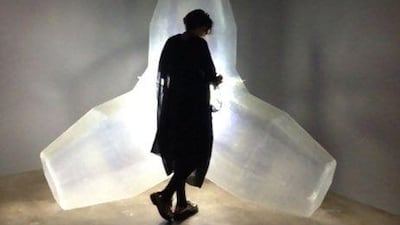Sophia Al-Maria shakes her head in mortified embarrassment. She's recalling the time she met Robert De Niro, who had been impressed by her award-winning short The Racer, about young boys' fascination with cars in the Gulf.
This was a big deal for Al-Maria: "I had posters of him all over my room in Doha - Taxi Driver, Raging Bull, they were all there," she says. "But one day I came home and my uncle had cut De Niro's head off all the posters because he didn't want djinn to possess the bodies."
Unfortunately, rather than just saying "Hello, Mr De Niro. Thank you so much for watching my film", Al-Maria recounted the strange tale of those decapitated pictures. "I immediately realised it was the most awkward story I could have told him," she laughs. "It was like, 'Hi, my uncle repeatedly cut your head off. How are you?'."
In the end, they got chatting about the specifics of getting a Nissan Patrol up on two wheels, so De Niro can't have been too unnerved.
On her website, Al-Maria posted a picture of them together, noting "it's all downhill from here". Actually, nothing could be further from the truth. Al-Maria had always wanted to write a book and when her agent told her the market for young adult, post-apocalyptic fiction was probably a bit crowded, attention turned to the essays she'd been crafting for the Middle Eastern cultural quarterly Bidoun.
"They were humorous stories looking at the different cultures my parents are from; my father has a Bedouin background and my mother is American," she explains. "I call myself Qatarican because of this. And all of a sudden, I was asked to collate this into a memoir. I have to admit, I was surprised, not least because it's a bit presumptuous and ridiculous to write a memoir if you're not 60-plus or haven't lived through a war or an addiction."
Al-Maria needn't have worried. The result, The Girl Who Fell to Earth, was published in America recently and is enjoying spectacular reviews. Some of this is down to Al-Maria's wistful descriptions of a changing Gulf environment; she effortlessly nails down the collision between modernity and tradition. But she's a compelling storyteller, too. How her parents meet is beautifully judged, somehow both comic and mournful (and, unsurprisingly, given Al-Maria's background, hugely cinematic). It also teases out another theme of the book: that when different cultures meet, it's not inevitable that they will clash.
"We're constantly told about these contrasting worlds but actually I think it's less of a big deal than we all think," she says. "There's very little difference between certain conservative elements of American society and the Gulf, for example. And I think my father just felt very comfortable with my mother's farming family. If people come from land, I think they instinctively understand each other, despite not having the same language.
"So my mother's family would sit around the cooler after working in the field, have a few beers and tell stories and jokes. It's the same in Saudi, really. People will sit on the tailgate of a truck, drink tea and probably tell the same jokes."
Still, as the book tries to make sense of her peripatetic existence, it becomes a personal response to the feelings of disjointedness that came with growing up in the Pacific Northwest, living in Qatar and studying in Egypt. "Having a second world to belong to immediately made me cast doubt on my place in the first," she writes. It is fascinating that Al-Maria finds a kind of freedom in the Gulf, the reverse of her father's situation. She dresses in "glitter-grunge-via-Gulf" and finds Qatar can be "a place where miracles happen" - although balance is maintained by her descriptions of her marginalised Bedouin family.
She still lives a peripatetic existence today. We meet in London, where she's been working on her latest film. In a few days she will leave for Cairo. But home is definitely Doha. "I feel like when I'm in Doha or Dubai or anywhere in the Gulf, I'm at my most creative," she says.
Her experiences in Egypt have formed the backdrop of Al-Maria's current project. Her first feature film, Beretta, is in the final planning phases, with the Dubai resident May El Calamawy cast in the lead role and the Girl with a Pearl Earring director Peter Webber producing. It comes as no surprise that Al-Maria is not going to pull any punches.
"Life on the street in Egypt as a woman is to be demeaned, touched, grabbed," she says. "I was pulled out from a car by a soccer mob. I got away but so many women don't. And I can tell you now, they all have fantasies of being strong enough to fight back. So the film is a revenge action thriller in the Quentin Tarantino vein, featuring a mute woman who goes on a vigilante killing spree."
And if that sounds sensationalist, Al-Maria says that's the point.
"Look, I actually want this film to be watched by these men so they see an action movie with a sexy girl but go beyond being voyeurs and actually identify with her. It just needs to make at least one person think twice."
When Al-Maria has time, she'll also return to art - her entry for the Gwangju Biennale in South Korea last year was a sculpture and sound installation that explored her interest in "Gulf Futurism", which she explains as a "projection of what the rest of the world would be like once global warming forces everyone indoors.
"There are lessons to be learnt from the way that the future is existing in the Gulf right now," she says, "and I can write essays and essays about it but sometimes there's nothing better than evoking feelings through art."
The Girl Who Fell to Earth (Harper Perennial) is out now
Follow us

